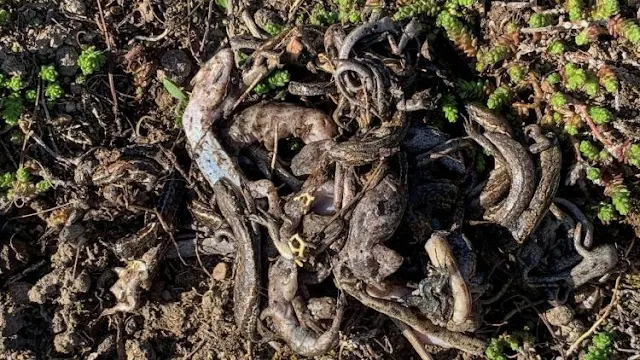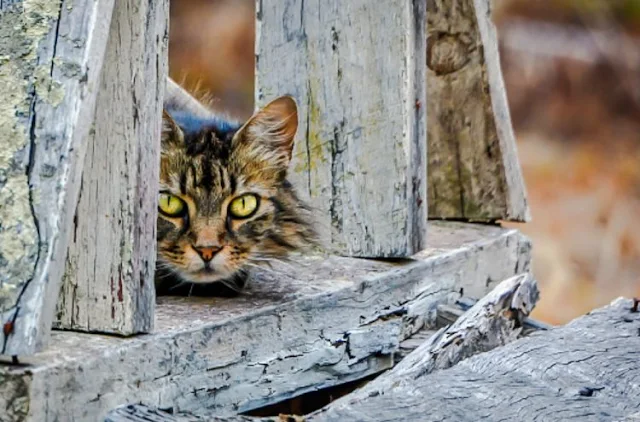I sense that New Zealand is following the way of Australia on how to deal with feral cats. But they are struggling in deciding the best path to control their numbers. But the bottom line about feral cats, in New Zealand, is that they are a predator and they are non-native. In other words, they are an invasive species and like Australians, New Zealanders are very attached to their native wild animals. They want to protect them. They are prepared to go to extreme lengths to do that.
"Cats have been left out of New Zealand’s ambitious plan to free the nation of introduced pests". - Guardian newspaper |
| Remains of 28 New Zealand lizards said to have been devoured as a meal by a feral cat. Photo: Joe Sherriff |
They will kill animals they consider to be pests such as rats, possums and stoats. They have a long-term project which is to make the island predator free under the Predator Free 2050 program.
However, in New Zealand cats are not part of this program. I'm not sure why. Perhaps it is because there is a cat lobby i.e. those who think that cats have a special place because there are so many domestic cats in New Zealand.
It is estimated that there are 1.4 million domestic cats and New Zealand has one of the highest cat ownership rates in the world. At least 40% of households have a cat at least a single cat.
They don't know how many feral cats there are which is the same problem that they have in Australia but they know they are in the millions.
And in another estimate, this time from a conservation group called Forest and Bird they believe that pet cats kill at least 1.12 million native birds annually. They think that the cat can make a bird species extinct on the islands.
RELATED: New Zealand news media reports that one feral cat regurgitated 28 whole lizards! True?
They know that birds are not a top priority prey animal for a domestic cat. This is because they are much harder to catch than mice and ground-dwelling animals. In some ways this helps to generate a more sympathetic attitude towards domestic cats. That's because people regard birds is more important than mice. It is called speciesism.
 |
| Feral cat NZ. Photo: Pixabay. |
And clearly cats are seen as more important than the predators listed under the Predator Free 2015 program.
This is about speciesism. The chair of the Kea Conservation Trust wants cats to be on the list. She said that she is not anti-cat but there are so many people who have cats in New Zealand and a lot of those cat owners do not regard their pet as a hunter.
She also wants tighter regulations on ownership of domestic cats. She wants New Zealand to be like Australia which requires owners to register their cats after three months and in some parts of the country there are limitations on the number of cats allowed in a household. They even have curfews in Australia for cats in some jurisdictions.
She says that dogs are heavily regulated but cats aren't. And that feral cats are contributing to the decline of the kea, the highly endangered Alpine parrot of New Zealand. New Zealand's native birds such as this parrot are defences against predators such as cats.
Jessi Morgan is the daughter of Gareth Morgan an ex-politician and a philanthropist who became very high profile in 2013 when he advocated eradicating cats under the Cats to Go campaigned. He was lambasted by many people including me. His ideas were opposed by the Prime Minister and Morgan received hate mail and even death threats.
That is the animal advocates fighting back. Animal advocates are perfectly happy for native species to be protected against predation by feral and domestic cats but any program to achieve this needs to be humane and decent. The big problem with Morgan's ideas was that they were cruel. They were along the same lines of Australia and pretty well everything that Australia suggests in respect of feral cat controls are cruel. They are inhumane.
Fortunately, Morgan's daughter who is the Chief Executive Officer of Predator Free New Zealand Trust has a slightly less objectionable view on how to deal with this problem. She wants domestic cat ownership to be regulated but admits that they also play an important part in society.
She said that: "the tools for controlling cats are limited, especially if you are near populated areas, because you can't run the risk of killing a well-loved moggy."
She is referring to killing feral cats and at the same time inadvertently killing domestic cats that are allowed outside. And this one of the big issues with controlling feral cats by killing them. You're going to kill someone's cat companion. The Australians don't mind this. But it seems that New Zealanders do mind and therefore they have a softer approach currently to the "feral cat problem".
Miss Morgan advocates for responsible cat ownership and educating people about the impact that domestic cats and feral cats have a native species in New Zealand.
Her point of view, therefore, is to restrict feral cat numbers through better domestic cat caregiving. This would be a long-term project but it would be humane. Ultimately the presence of feral cats comes down to careless cat ownership. And, in my view, you have to think long term in order to deal with feral cats.
It is the only way you can deal with them humanely. Mass extermination by poisoning and shooting simply does not work. And it is immoral, inhumane, indecent and at the end of the day wrong. It is also very bad publicity for Australia as a nation.
Personally, I sincerely hope that New Zealanders decide on a long-term project which both improves cat ownership and which gradually chips away at feral cat numbers and stabilises the population. If they stabilise the population (TNR?) and reduce the source of feral cats (better ownership), eventually the so-called feral cat problem will go away.



No comments:
Post a Comment
Your comments are always welcome.
Note: only a member of this blog may post a comment.